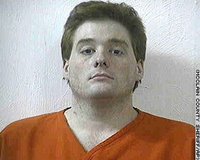The Richthofen Case * Part Two * Parte Dois

A crime that involves more than one culprit tends to present certain problems. When only one person has commited a crime, we know that person did everything, including the planning and execution of the murder. This is an aspect that has raised much debate in the Richthofen case, where the planning and execution on the crime was divided among three people. Suzane Von Richthofen’s parents were murdered and she seems to be the mentor; but her boyfriend Daniel Cravinhos and his brother Christian were the ones who actually commited the physical act.
Suzane and Daniel were together for a while when all of this happened. Suzane’s parents knew him, had frequent contact with him, it is known that they even went on vacations together. Apparently problems began when Manfred and Marísia found out their daughter was smoking pot with her boyfriend. Panic. Suzane was no more allowed to see Daniel. They were very strict, Suzane would later say. Fights and constant yelling began and were soon happening on a daily basis; the punishments and curfews too. It soon became unbearable for Suzane to cope with the frustration of not being able to do whatever she wanted, and the double murder began to be planned in her head, before anything, as a consequence of her hate.
It is not at all uncommon, if we look all over the world, to see stories of children that murder their parents. The opposite happens frequently too. These types of crimes are the pathological manifestation of something we all have: hate, including for the people we love. When my dad used to say to me, you can go out, but you have to be back by midnight, of course I’d get angry. We all had friends without curfews, friends who can stay out until whenever. And when I got back at 2 am instead of midnight, of course my dad felt angry too. Damnit, I have to sit here and worry about this disobedient daughter of mine. But our hate never destroyed our love. As much as we felt angry we didn’t act out on that anger – as much as in any human being, the homicidal hate exists and is very real, but we’re able to neutralize it, to control it, and our love is usually able to win the fight for as long as we don’t destroy our relationship with our hate.
It really takes a lot of love to hold back a person with a lot of hate – specially if this person doesn’t have the natural social restraints of the healthy human being, that profound disrespect for what’s right and wrong like I said in a previous post about the anti-social personality. A curious thing about all this is that, among the three killers, Suzane was the most affected by this crime, and with that she made it clear what her real motivations were: her own interests. And no one else’s. These parents get in my way? Off with them. Many people are going to suffer with this act of mine, our friends, the people we know and love, our family, my brother Andreas, who’s only 15 years old and will lose his parents, just like me, in the most violent and shocking way. What can I do. This that I’m doing will be a favor for Andreas too. We’ll have money, he won’t miss anything, it won’t make much difference. And he’ll also be free. At some point, everybody will forget about this and I’ll be here enjoying my life, doing whatever I want. No more limits, no more control.
It’s easy to see that a person like this has no real grasp on the impact of her acts. Manfred and Marísia were Suzane’s parents, and her parents were the victims chosen for this crime. It wasn’t the boys’ parents, who watched horrified their only two sons turn into the most despised people in all Brazil. It was the parents of that girl who climbed up the stairs to her home late at night, all alone, to make sure that Manfred and Marísia were fast asleep, harmless and unaware. Before going back down and clearing the way for her parents’ killers, she turned on the upstairs corridor light so that they could see where they were going. So they could be more competent in their act. And while two guys were smashing her parents’ head in the second floor, she was quietly sitting downstairs, listening to two people’s last moments of horror.
But not without checking on them first, let’s not forget. She hardly thought of anything else other than if her parents were in interesting conditions for her to do what she wanted to do next, against their will and without their knowledge, and against the will of her community, of the law and of the world where she lives.
And that’s a perfect psychopath.
(Suzane’s dominating strength seems to be the central aspect of this case. Later, we will discuss her interaction with the Cravinhos brothers, their part in this story and their possible personalities).
***
Um crime que envolve mais de uma pessoa apresenta certos problemas. Quando uma só pessoa é responsável, sabemos que ela fez tudo, planejou e executou. Essa questão levantou muito debate no caso Richthofen, onde o planejamento e a execução do crime foram tarefas divididas entre três pessoas. Os pais de Suzane Von Richthofen foram assassinados e ela parece ser a mentora. Mas o namorado Daniel Cravinhos e seu irmão Christian foram os fisicamente responsáveis pelos assassinatos.
Suzane e Daniel eram namorados já há algum tempo. Os pais de Suzane o conheciam, conviviam com ele e até viajaram juntos. Aparentemente os problemas começaram quando Manfred e Marísia descobriram que a filha e o namorado estavam fumando maconha. Desespero. Proibiram a filha de ver o menino. Eram muito rígidos, Suzane mais tarde diria. As gritarias e proibições se tornavam cada vez mais constantes; os castigos e punições também. A frustração de não poder fazer o que queria claramente ficou insuportável para Suzane, e o crime começou a ser planejado na cabeça dela, em decorrência do seu ódio.
Casos de filhos que matam seus pais não são tão incomuns se olharmos para o mundo. O contrário também vale. Esses crimes são a manifestação patológica de algo que todos nós temos: ódio, inclusive pelas pessoas que amamos. Quando meu pai me dizia, você pode sair, mas tem que estar de volta à meia noite é claro que eu ficava com raiva. Sempre temos amigos sem toque de recolher, que podem ficar na rua até mais tarde. E quando eu voltava às 2 horas ao invés de meia noite é claro que meu pai ficava com raiva. Caramba, tenho que ficar aqui preocupado com essa filha desobediente. Mas o nosso ódio nunca destruiu nosso amor. Podíamos ficar com raiva mas não atuávamos essa raiva – como em qualquer ser humano normal, o ódio homicida existe, mas somos capazes de neutralizá-lo, ter algum controle sobre ele, e como temos amor além de ódio, o amor costuma vencer e o ódio não consegue destruí-lo.
Realmente, só o amor é muito pouco para segurar alguém que tem muito ódio – e que não tem as travas sociais naturais do ser humano saudável, aquele profundo desprezo pelas regras que mencionei no meu texto sobre a personalidade anti-social. O detalhe mais curioso disso tudo é que, considerando-se os três responsáveis por este crime, Suzane obviamente é a mais afetada e com isso deixou clara a sua verdadeira motivação: seus próprios interesses. E os de mais ninguém. Esses pais me atrapalham? Pau neles. Literalmente. Muita gente vai sofrer com essas mortes, minha família, meus amigos, nossos conhecidos, meu irmão Andreas, de 15 anos, que como eu, perderá os pais dessa maneira tão violenta e súbita. Paciência. Isso que eu vou fazer é um favor ao Andreas. Vamos ter dinheiro, não vai faltar nada para ele, não vai fazer muita diferença. E ele também vai ficar livre. Uma hora vai passar, todo mundo vai se conformar e esquecer, e eu vou estar aí, numa boa, com meu namorado e com o dinheiro dos meus pais, para fazer o que a gente quiser. Não à proibição, não ao controle, não à coleira.
Dá para ver que essa pessoa não tem noção nenhuma do impacto de seus atos. Manfred e Marísia eram os pais de Suzane, e seus pais foram as vítimas escolhidas para este crime. Não foram os pais dos meninos, que acompanharam envergonhados e cabisbaixos seus dois únicos filhos serem arregaçados pelo Brasil inteiro. Foram os pais daquela moça que antes do crime subiu as escadas de sua casa, sozinha, para se certificar de que Manfred e Marísia se encontravam ali, dormindo e inofensivos. Antes de descer e dar o ok aos assassinos de seus pais, ela acendeu a luz do corredor para facilitar sua tarefa. E por fim ficou sentadinha no andar de baixo, ouvindo os últimos agonizantes momentos de seus pais, sendo mortos à golpes de barra de ferro.
Mas antes de tudo Suzane subiu para dar uma olhada neles, não podemos nos esquecer. Dificilmente pensou em qualquer outra coisa a não ser se seus pais estavam em condições interessantes para o que ela gostaria de fazer em seguida, contra sua vontade e sem seu conhecimento, e contra a vontade da comunidade, da lei e do mundo onde ela vive e que a acolhe.
Eis a perfeita psicopata.
(A força dominadora de Suzane me parece a linha central deste caso. Em seguida, vamos pensar sobre a interação de Suzane com os irmãos Cravinhos, seus papéis nesse crime e o que podemos concluir a respeito da personalidade de cada um).



